India had been popping up in conversation more and more frequently. My memories are of hippy travellers who visited in the 60s and 70s living poorer than the locals getting regular bouts of dysentery then arriving home a shadow of their former selves. It didn’t interest me in the slightest so it took some convincing it had become a destination of choice. I was certain the squaller would still be thick on the ground but there was also the bones of a tourism industry sprouting. Small family run hotels, amazing food and pledging tours, best we get in whilst there is difference.
The plotting started. Robyn and Jane Yule met at Roth Boti, a famous Indian restaurant in Hampton St. They feasted on pumpkin bhaji, palak paneer, butter chicken and pillows of charred roti all washed down with very un-Indian crisp white wine. Each visit to Roti Boti made them feel like they were condition training ready to tackle Rajasthan and Kerala.
Jane scoffed at the outrageous tour prices being thrown about in such a poor country and started negotiating with an Indian friend of a friend at Queensland University. Not long after Jane triumphantly announced that a deal had been done. A new car, a driver and a guide…of sorts, would all be waiting for us in the University town of Kurukshetra, North of Delhi.
We arrive in Delhi late in the evening after breaking our flights with a day in Kuala Lumpur visiting Jane’s cousin, Cathy who works for an Australian university there. We are not ready for Delhi’s relentless wave of humanity. India’s population has increased to a staggering 1 billion persons and I simply can’t fathom the numbers. They produce more babies than there are Australian citizens, I shake my head at the thought. It’s overpowering, the noise, the hustle and the people in your face. I just want to close the door on the whole experience and maybe face it tomorrow… maybe.
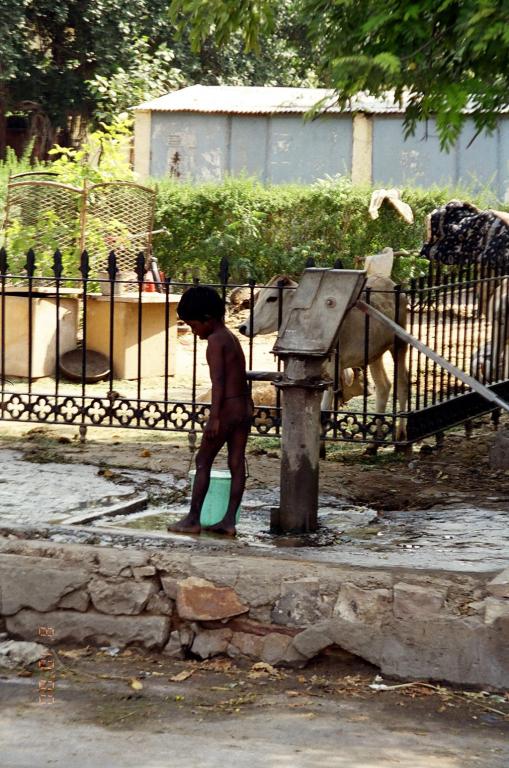
Everyone is on the take, everyone. No discussion can take place without the talk including the phrase “my cousin, brother or uncle can help you.” We are a golden opportunity, a cash cow and our requests to be taken to a certain hotel are met with enthusiastic nodding but deaf ears. We lurch from one dive to another. Finally we climb four floors of a hotel to find we are all in one dirty room. Down stairs we go wondering why our English refuses to be understood. More nodding then we are marched around the corner to a newly constructed hotel still clad in plastic wrap. We haven’t even the strength to wave surrender the place is more a construction site than a hotel. We slump beaten in the foyer then drink a large bottle of local kingfisher beer each before trudging dejected up to our spartan rooms. It’s 1am and as hot as hell. We close the door to our room, turn on the new yet wheezing air conditioners and magically the blaring traffic is reduced to a murmur. The mattress is still in its wrapping, the bedding slides about and every movement is crackling static.
Our plans of taking the train to Kurukshetra are thwarted at every move. “Sorry, It’s a public holiday, my friend can get a better price, the trains are all booked out, the buses are too crowded.” It goes on and on. Why not take my cousin’s car he is a very good driver and we can do a good price. Getting angry which is my fallback instinct when I feel I’m being done over doesn’t work with this lot. How can you be angry with someone who is totally oblivious to your frustration. In fact revels in your red face and wringing hands ? Their lives are hardwired to embrace frustration, they seem to revel in complex situations, often of their own doing and the acceptance that it will happen in its own good time. Nodding yes and no simultaneously with this unique head wobble encapsulates the whole philosophy… and I want to scream. So I wasn’t surprised when I find myself with the girls in someone’s cousin’s car zooming North to Kurukshetra. Four hours of horn blasting bedlam and I am only able to identify one road rule ? Our driver gives way to large oncoming trucks everything else is fair game.
Our organised rooms on the university campus are relief from the constant onslaught of humanity. Shushma the academic from Queensland university and her husband Ram are delightful people. Professor Ram Niwas has been blind from birth and the calmest person I’m sure I shall ever meet. He is a professor in English Literature and relies totally on his amazing memory. We watch as students come and go asking questions of him as he sits cross legged in his immaculate clothes. Nothing phases him, the students hang on his every word. I try to picture myself living with such a disability in this tough environment, it’s beyond my imagination, I am in awe of him and his positive disposition.
A few days on campus and we are being lulled into a false sense of security. Cups of tea and toast with jam start our days. Having conversation without feeling that someone is trying to put their hand in your pocket. It must be time to move on. Our driver, Billa and guide, Jazi are summoned for introductions. The car hasn’t arrived as planned but I’m not surprised. Instead we head to Chandigarh to trial our team. Instead our team trials us. They find the maximum speed it takes to have us shouting at them to slow down whilst we clench the front seat convinced we are going to die. Neither our guide nor driver are professionals. Both have just finished their final year of environmental science and this will be their first job. You can see from their eyes that it is a massive adventure for them too. A chance to see their own country courtesy of three Westerners. Finally we are off.
Chandigarh has an amazing rock garden built by Nek Chand, a council worker / self taught sculptor. Nek formed the garden after hoarding assorted rubbish discarded from nearby factories. On some vacant land behind the council yard he started building his statues and rock walls from this rubbish. Eventually his secret became too big to hide and he was offered the chance to expand, the council embracing the idea. It’s Gaudi like, amazing, weird and left field inventive. We are the only Westerners in the place. We swing on giant swings, wander through the water features and turn to face bleached rock walls built from recycled industrial components.

Robyn has been appointed hygiene and food inspector. We have all agreed before leaving home to give any form of meat a big miss. India has daily ‘brown outs’ loss of electricity for hours which causes the meat to defrost then freeze again. Not great. It’s like winning a lottery without a prize you want to take home. So spicy vegetarian it is…
Jane is in charge of squeezing the best hotel deal and keeping the two boys in check. She doesn’t hold back either. When they toss their plastic water bottles out of the Mahindra’s window “you have just completed University in environmental studies, stop and go and pick them up.”
Me ? I’m to stay with the boys, watch the car and carry heavy suitcases. The boys look at me saddened that I am not out the front waving my arms about like a true Indian Maharaja. Their disappointment is palpable. I don’t even think me wearing a souvenir silk turban and trying a little head wobble would remedy their disappointment.
No visit to India would be complete with a walk on the cool marble of the Taj Mahal, one of the Seven wonders of the modern world. We attempt to get there at sunset but are caught in a traffic jam and arrive in the dark. We agree it’s simply a dry run for tomorrow and head back to our hotel for a couple of twilight kingfisher beers. At 6am the following morning we are in our Mahindra sure of our route. The boys are like children on Christmas morning they have never seen the ‘Temple of Love.’ The silhouette is immediately recognisable and it shimmers with the rising sun rising behind it.

The calm, serene ambience it exudes blows us away. Shoes removed we glide across the cold well worn marble flooring, a tactile pleasure in itself. Behind the Taj we can hear children laughing as they wash in the stagnant river. Our noses twitch as we peer out over the Yamuna river. How can they allow this permeating stench so close to such an iconic building as the Taj Mahal ? We have the Taj pretty much to ourselves for an hour and slip away as the tour buses begin to trundle in.
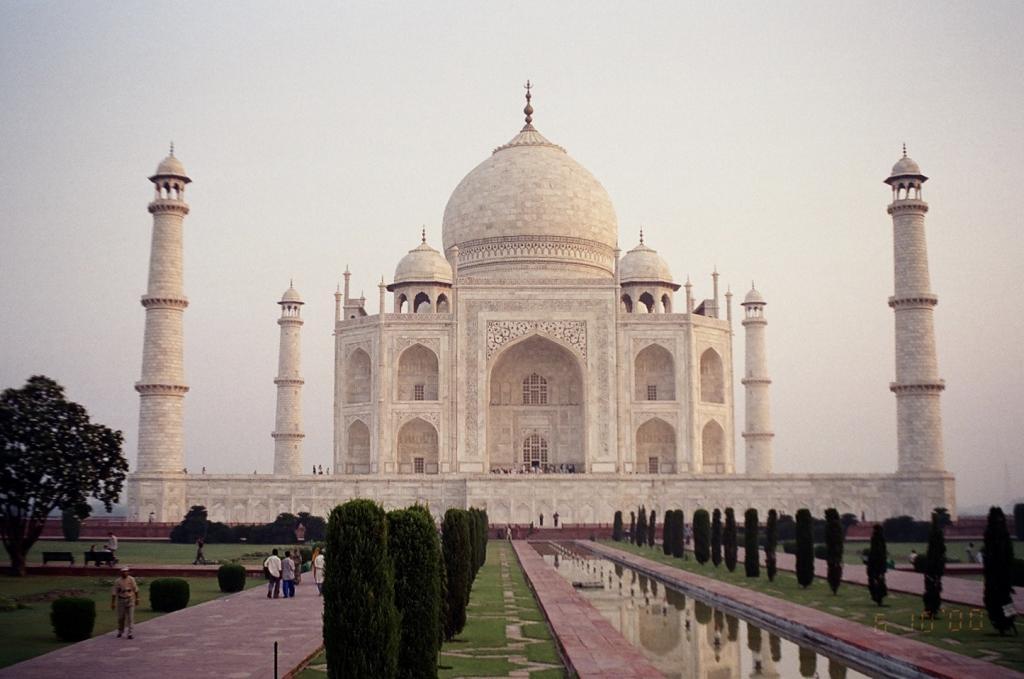
We head to Fatehpur Sikri, a desert fort which took 15 years to build but was only used for 14 years. It is commanding yet eerily deserted. We wander about being relentlessly pestered by touts. I spot brown bears shackled in heavy chains on the side of the road being forced to stand on their hind legs as we pass. If we stop they will demand money from us says Jazi. I feel a rock in my stomach and hope to see a worn leather sandal in the bears mouth as we head back for lunch.
Lunch was at the well named, poorly spelt Qwality restaurant. I giggled to myself as we loaded up on qwality vegetarian everything. Dessert is the heavenly silky smooth vanilla ice cream whilst the girls have fallen for the jumbo sized masala dosa.
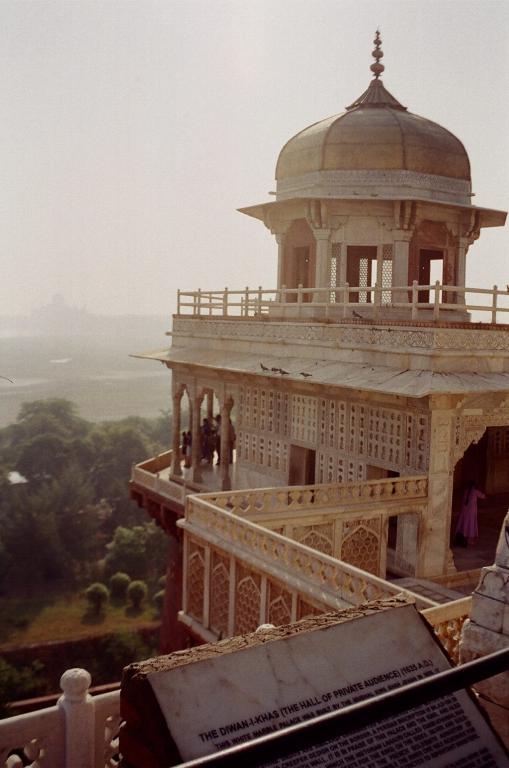
It’s 240 kms to Jaipur and we are oblivious to the outside heat. The higher the sun goes the lower we crank the a/c. Then it stops, not a bang nor a whimper just silence. The temperature in the car quickly rises as do our concerns. A quick stop to check the fuses but all seems ok. A visit to an auto electrical workshop where the only tool appears to be a length of wire highlights nothing. A visit to a dealership who have yet to see this new model feels more like a presentation than a chance that they will fix our problem.
Windows down we lurch off towards Jaipur eating large gasps of hot dusty air. Finally into our hotel Atithi on the outskirts of town in time for pre dinner drinks at one of the nearby swanky palace hotels. We return to our cheap rooms and lay out about luxuriating in the chilled air.
A walk into the middle of Jaipur is an attack on the senses. Rubbish, rodents and ruddy cows fossicking amongst the filth. Open sewers and rotting vegetation permeate in the sweltering heat and you are left wondering how people can live without life threatening disease in these conditions. Through all of this swirling refuse you will see an immaculately dressed local woman pick a path, oblivious to her surroundings, staring straight ahead. The saris of these Rajasthan women are legendary, bold striking colours, purple, orange, ocean blue often with shimmers of silver woven into the fabric.
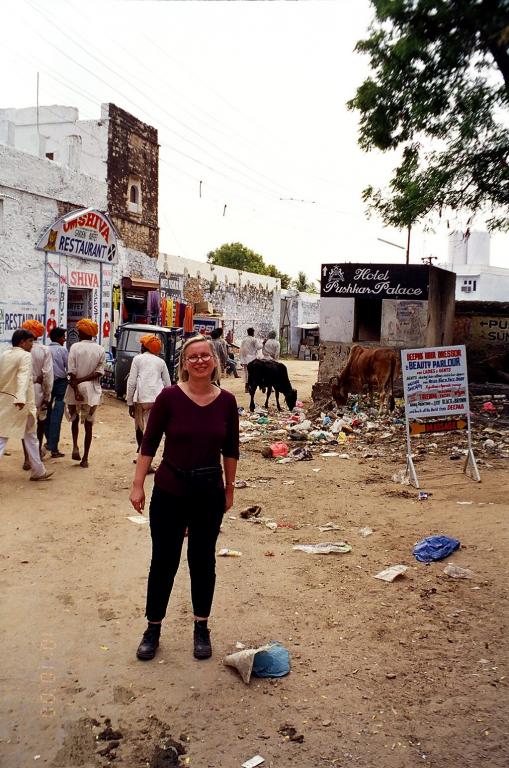
Against the hot sandy dessert background the saris are more mind blowingly beautiful than a Parisian catwalk. Meanwhile we stumble amongst the swirling rubbish towards the Hawa Mahal or the ‘Palace of the Wind’ and pray the wind is blowing the other way. The palace is a couple of hundred years old built of beautiful red and pink sandstone with much intricate stone lacework. This enables the building to be shaded yet allows the desert wind to waft through and cool the interior.
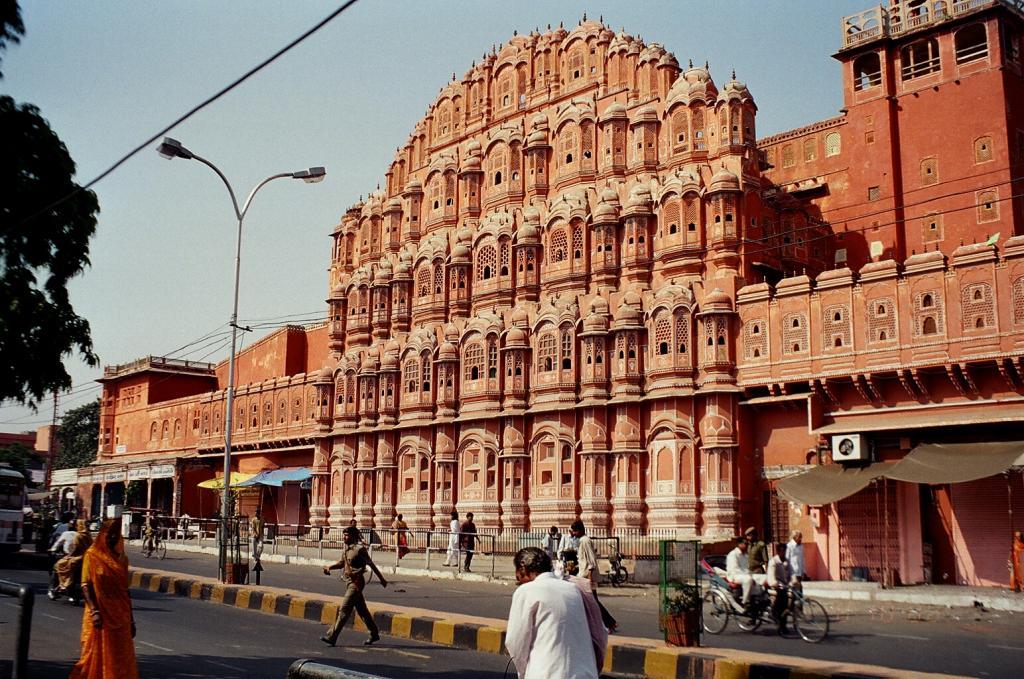
For all of the history of the Hawa Mahal it’s our twilight drinks at the nearby Rambagh Palace that are my highlight. I’m nestled back in a high wicker cane-chair like the Maharaja himself. Attentive waiters in starched uniforms dart about with tall glasses of gin and tonic on tarnished silver trays. Two rounds of drinks will cost more than our accomodation, driver, guide and meals but somehow it still feels like a bargain and we deserve it. Pfff. Jane plucks up enough courage to ask for a Palace hotel room inspection. Evidently she nodded approvingly as you checked the room, furniture and wash areas but at US$775/night chose to come back to Atithi with Robyn and I. That’s loyalty but more likely because our hotel is US$8/night ?
Onto Pushkar once we get the car’s a/c sorted. Like all of India it entailed much paperwork, one electrical mechanic repairing the broken relay switch and an entourage of ten assistants looking vaguely interested whilst doing bugger all to help. But what are you to do when your population is one billion people ? Everyone does something however small to earn enough rupees to feed themselves a bowl of rice.
Jane’s back is sore maybe it’s bouncing around for hours in the Mahindra, it’s a stiff ride but I suggest it’s from riding our driver and guide too hard. Robyn and I leave her to rest and skirt the ghats on the edge of the large lake. The town is full of Western hippies who wander about in their dreadlocks and threadbare cheesecloth. I have a shave and massage from one of the street barbers whilst we discuss the cricket. It’s always a conversation starter here, they know more about the Sustralian players than I do, everybody plays. We break into our supply of Bombay Sapphire gin back at the hotel and after a very average meal at the Pushkar Palace overlooking the magnificent view return to rinse the remnants with another gin and tonic.
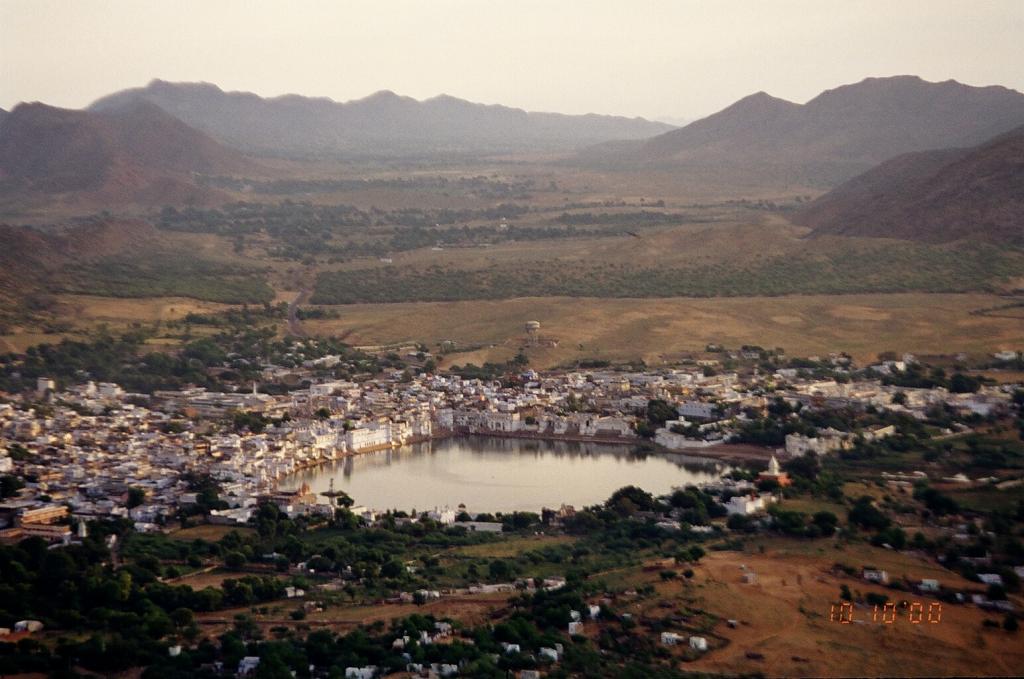
Jazi tells us that we will climb hard rock today on our way to Jodphur. Hard rock is his interpretation of a mountain range. We are tossed about in our rigid Indian built Mahindra as we weave up and over the mountains. We have tea at 7,11 and 2pm. It is an old English custom smiles Jazi knowingly. He is convinced he is living an identical life to us and for the moment he is. We laugh and nod but are sick of the constant stopping.
It’s late afternoon with just enough time to visit the old fort of Mehrangarth. As the sun goes down so does the searing heat from the sun. Boy does it get hot here during the middle of the day. You must hide from it. The fort is one of the biggest in India and has commanding viewers of the surrounding countryside. There are scars and pock marks on the thick ramparts where cannonballs attempted to pierce the outer wall during invasions hundreds of years ago.
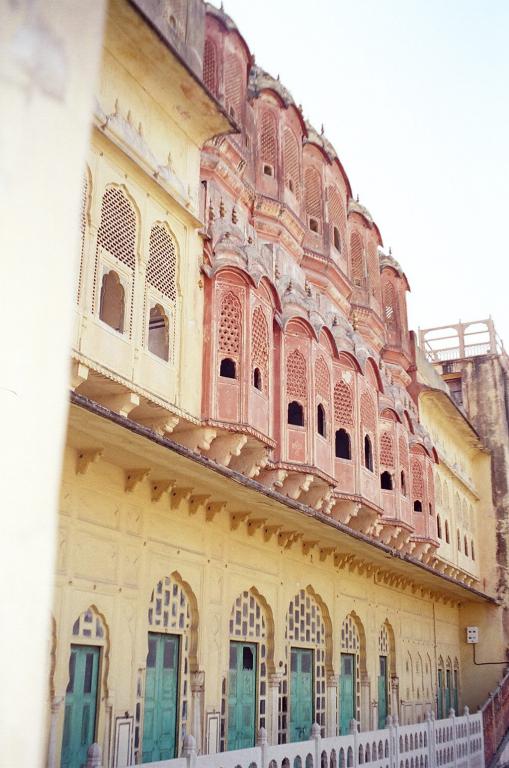
After the fort visit we wander through the alley ways in the old city. It’s a relief after the touristy Pushkar where everyone wanted something out of your wallet. Here the people smile easily. Jane and Robyn are asked to inspect a young family’s home. I wait outside until the hygiene queen, Robyn reappears in the street announcing the interior is spotless and a credit to the couple. Not long after two mothers thrust two young babies at the girls. The proud mothers wanting to hear words of admiration although I can only think that they are two more in a population of a billion. I nod without commenting then turn to walk down the street careful not to step in cow dung, open sewers and avoid speeding motor scooters.
We move on towards Jaiselmer. A long days drive has a shaky start when at a small intersection Billa spots a pedestrian wildly signalling him to stop. An out of control truck careened out from a minor street and would have certainly taken us out. Even the super calm Billa, the guy unfazed by Delhi traffic mutters something in the trucks direction. The rest of the drive was boring other than the mass gatherings of Indian troops. We are close to the Pakistan border and the Indians are in constant fear of invasion. Over one million troops are evidently stationed along the border. “Men of steel” Jazi announces beating his rather insipid chest. Jane teases him and declares him full of propaganda, tomorrow we go there she announces. Jazi’s eyes grow wild and fearful. “No, no,no..” The day finishes as it started with an Indian army truck almost sideswiping us. Time for a long gin and tonic is the consensus.
The Jaisalmer fort is pretty much fully intact and the most perfect example of the castles I built as a child on the beach. The fort was built on a strategic trade route it’s demise and importance waned over the centuries as trading moved towards the sea. Today the fort is a living breathing example of another time. Thousands of people live within its thick, heavy walls. We had planned to stay at one of the original havales but they are a little too authentic, generally airless rooms with a bed. Instead we take rooms at the Jaisel Palace nearby and celebrate having rooms with a breeze. At sunset we admire the nearby fort through the bottom of numerous small green bottles of kingfisher beer.
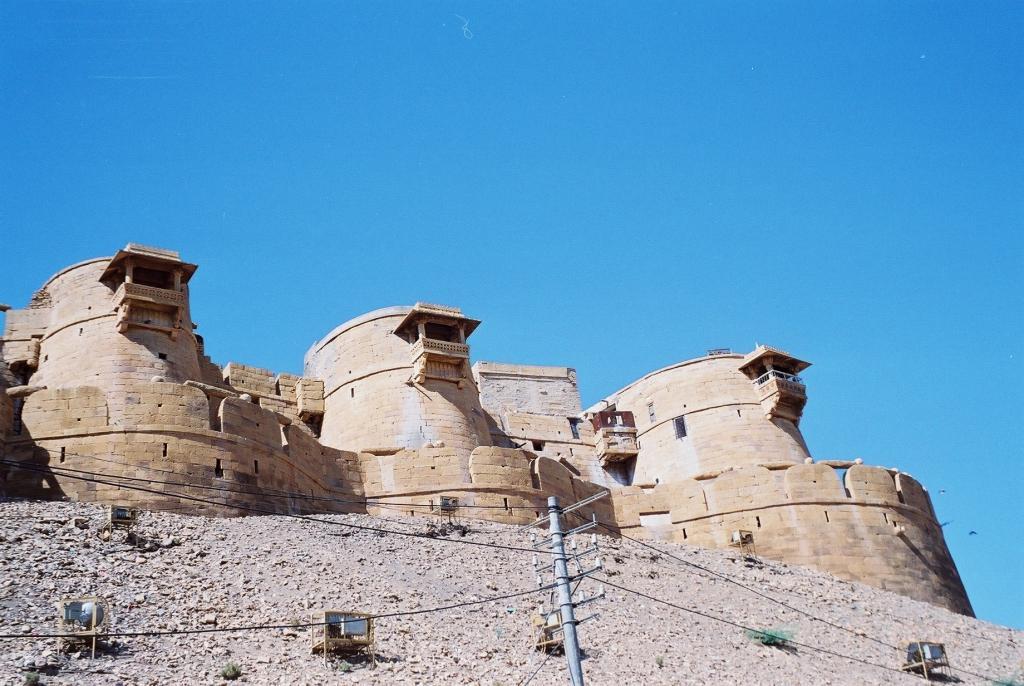
Jane and I head out into the dessert with the boys to check out the sand dunes near the border. The dunes go on forever in every direction. Soft sandy hills carved into repetitive sweeps by the constant whoosh of the wind. It’s eerily quiet out here. We taunt the boys that we can hear advancing Pakistani soldiers, they rightly ignore us. We question the ability of their ‘men of steel’ to defend this barren land. Billa diverts our teasing by asking if we want to drive. We give it our best Indian interpretation. One hand constantly on the horn, weaving around imaginary sacred cows and the radio blasting their Hindi pop shattering the dessert stillness. We do everything except concentrate on the road ahead. We pass our driving test with flying colours.
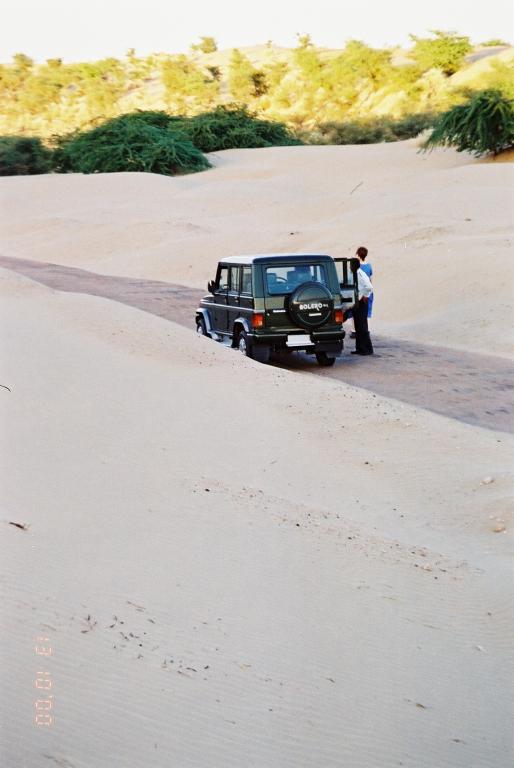
Back to hotel Devi Bhagwan and it’s garden of tranquility in Jodhpur. Robyn has been telling everyone we meet to stay there which is great. except now we struggle to get a room. We head out for a late afternoon kingfisher at Amit Bhawan. We settle and a couple of drinks becomes dinner. We eat a feast of delicious vegetarian dishes under the stars whilst under the table a swarm of mosquitoes feast on my ankles. Somehow the service doesn’t match the tasty food. Maybe it’s the khaki uniforms which allow the staff to successfully hide amongst the garden setting.
Another long driving day towards Udaipur. We leave Jodhpur before the sun gets any of its bite. We are rattling along making good time when suddenly we come to a screaming holt in a traffic jam in the middle of nowhere. Word comes down the line that a truck has broken down and with a constant stream of traffic heading both ways no one can pass. We follow a truck onto a dusty minor road. Of course with the windows up tight the a/c decides to cough splutter and stop. We are three dripping wet Westerners whilst our boys laugh at our wet hair and beetroot heads. Eventually back onto bitumen and the windows down it’s blissful relief.
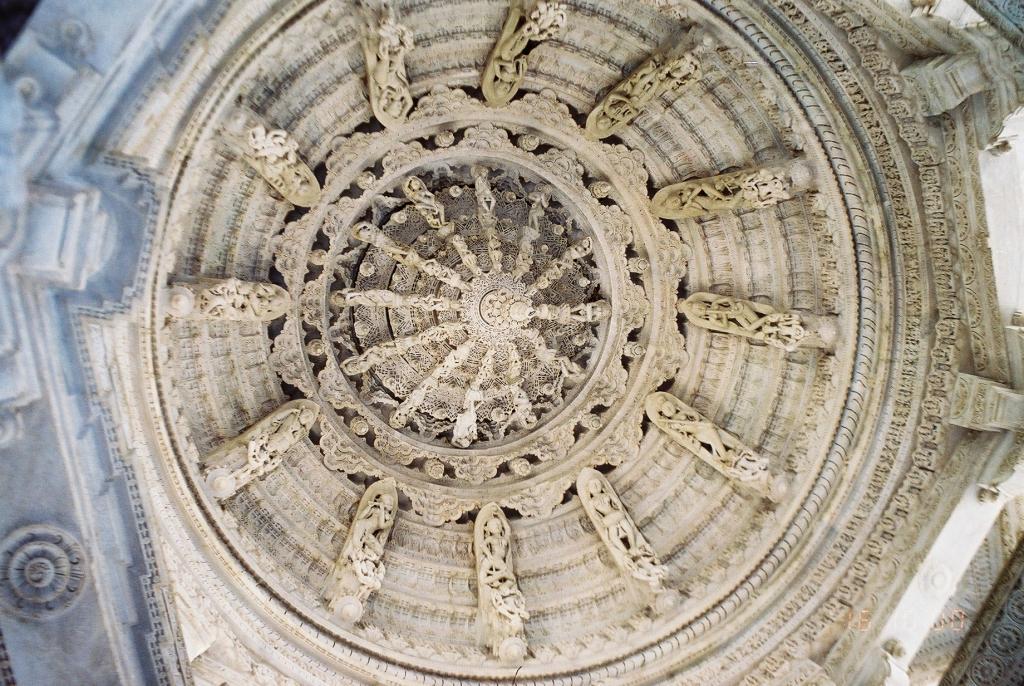
Finally we reach Ranakpur and a 600 year old Jain temple that the girls are keen to visit. It is quiet, free of touts and has an amazing 1444 intricately carved columns supporting it. A light breeze runs over our wet t-shirts and together with the cold marble floor I voice my thoughts of staying here till dark. Our two hired help shake their heads in unison “it’s not possible Mr Jeffrey, no, no, no “
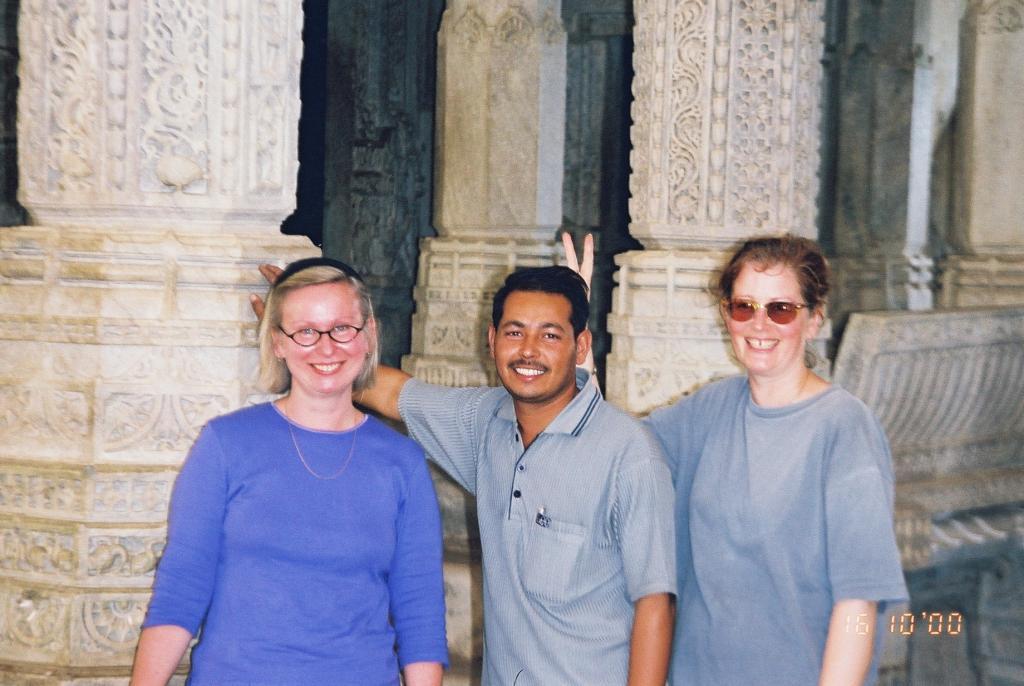
Up and over a small mountain range with a smattering of small villages struggling to grow enough food to survive. I ask if we can stop at a small well. I’ve spotted a woman walking two bullocks in mesmerising circles around a central pole. The well is 30m deep and the turning of the pole causes a series of small buckets to lift water to ground level for crops, animals… survival.
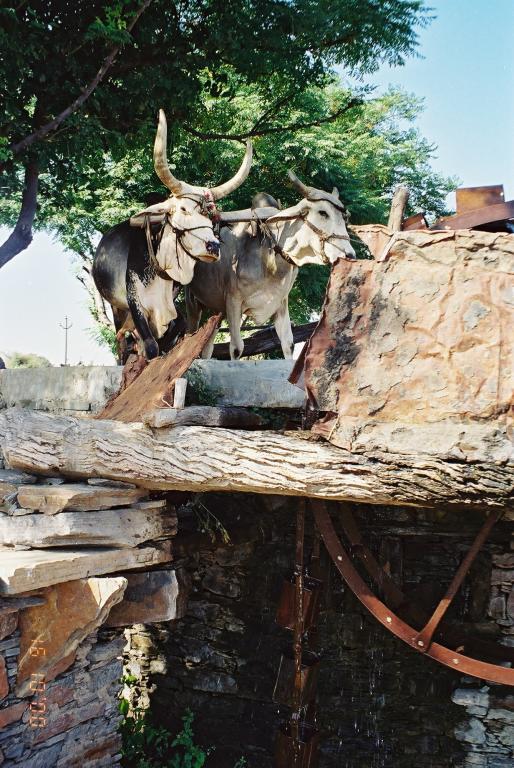
It’s 5pm and surely past Kingfisher hour when we cross a narrow bridge to the Lake Pichola hotel. We had considered trying to stay at the Lake Palace hotel till our eyes watered at the nightly charge. Instead we are on the lakes edge with a small balcony admiring the famous lake and distant shimmering Lake Palace. Two boys play in the lake’s murky water then try to stand and balance on huge lily pads. Every day in India I’ve seen someone do something I’ve never seen before. A billion others mean you’ve got to stand out.
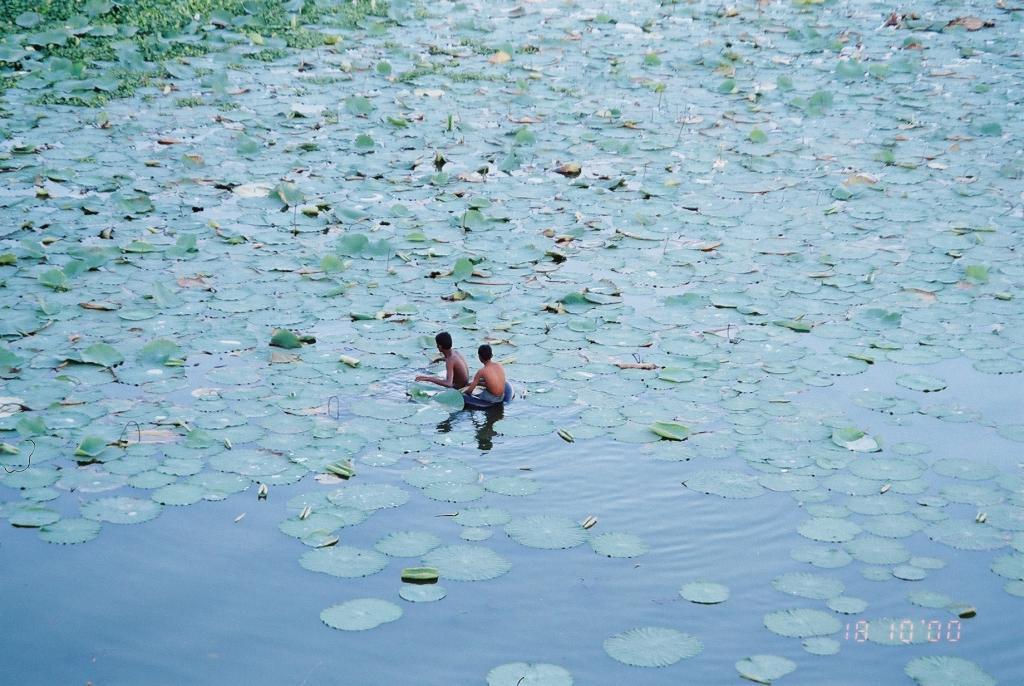
We head out for more beers and a curry to celebrate the end of our driving section of the holiday. Robyn and I wake to the steady dull thud of women belting clothes clean on the ghats opposite our hotel. The slap reverberating across the still water. I’m positive I can spot one of Janey’s striped t-shirts being given a thrashing way yonder.
We say goodbye to our boys. Today they leave us and head home to their mothers. It’s been quite an experience for us and an eye opening tour of Rajasthan for these two students. I’m unsure who got the most from our road trip but it’s sad to see them go. As a parting gesture they simply brush the rubbish in the boot onto the ground. Jane feels they’ve learnt nothing and gives them a final brow beating. Respect your over populated country, god you’ve just finished a few years of environmental studies !
We get about by auto rickshaw for the next few days. They wheeze under the weight of three Westerners and a scrawny driver. Late afternoon we catch a rickshaw to the Monsoon Palace high up in the mountains. The 100cc motor gasps under the strain, I’m sure the engine will have a heart attack but our driver nurses his machine like a concerned mother. It’s cool and refreshing at the top. The crawl to the top is exactly the opposite on the way back down. Our driver simply free wheels all the way with me concerned that we will topple over. Our speed, his belief in fate and his inability to slow his baby down are a simple grin on his face. I live to tell the tale.
Dinner is at the Jagat Niwas and only memorable for being an airless room. Our rickshaw driver waiting outside is putting a lot of hard work into trying to win Jane’s heart. He is disappointed when she refuses to go out drinking with him as he turns and spits into the dirt again.
Our randy rickshaw driver is waiting for us at 8am the next morning. He seems to be on call 24 hour/day. We heard a whisper yesterday that there is a German bakery in town. Apple cakes, real brewed coffee what a change from our breakfasts of the last two weeks. That’s not fair really we’ve had toast and tea most days which I’m sure is a remnant of the long British occupation. Dinner finishes early after I feel something scamper over my bare feet. Rats I declare. Squirrels suggest the girls then one is spotted. “Rodents” they squeal…. we scurry back to the relative safety of Lake Pichola hotel.

We’d all been dreading the plane from Udaipur to Cochin via Mumbai. Were we really expecting spluttering engines and people strapped to the roof ? It is event free. Cochin is tropical in comparison to the dry dessert heat of Rajasthan. We stare at cows secure in fenced paddocks, quite a change after the free spirited way in which sacred cows ambled anywhere they wanted in Rajasthan.
Robyn is struggling with a soft tummy so Jane and I leave her to try and sniff out a drink. Alcohol is banned in Kerala State so it’s under the shelf in a local dive or in a hidden room for Westerners in the back of some swank hotel. We choose a swank hotel but the a/c is so cold it drives us back out into the street after one drink.
Off to Cochin fort in a couple of auto rickshaws to wander the seaside. School children on excursion from somewhere inland are seeing the ocean for the first time and the banter and effervescent excitement makes me look at the sea in a whole different way today. It is different too because there are large numbers of water buffalo waist deep in the water chewing on a sea of healthy looking weed. Chinese style fishing nets sit high along the riverbank like gigantic stick insects. Of a night time with large lights suspended above the nets are lowered and raised capturing curious schools of small fish.
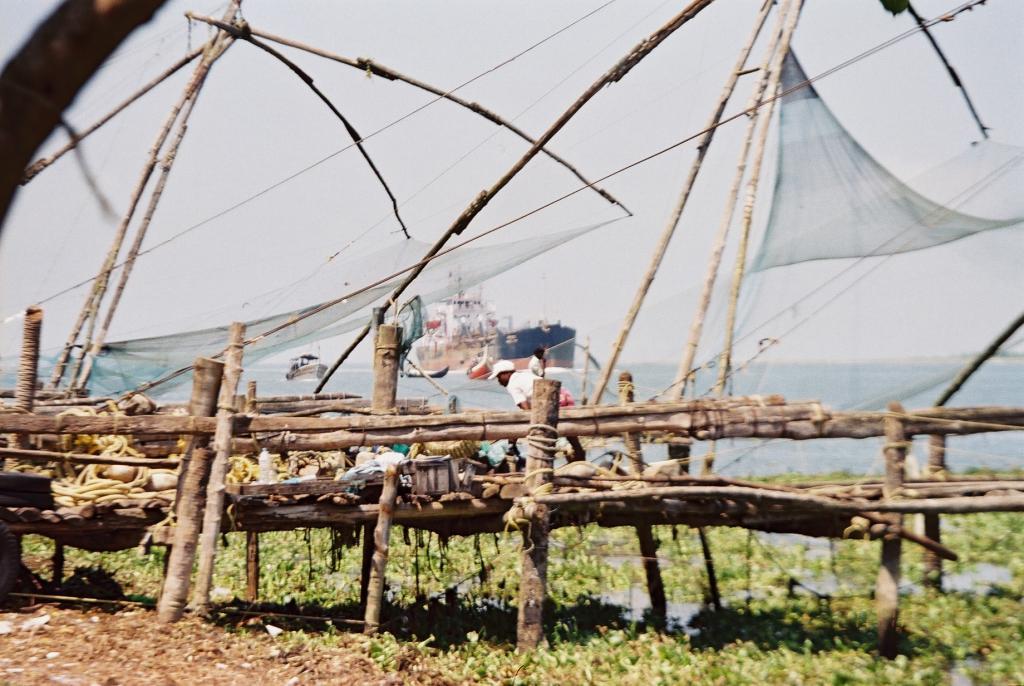
The afternoon has a religious twist. First the Church of St Francis where Vasco De Gama is buried. He rang a bell somewhere in my memory bank ? The Portuguese explorer often labelled as the first Westerner to step foot on the Western Australia coast. Well his last step was here and he is buried under the church’s stone floor. Then it’s the Vasilica of Santa Cruz full of pictures of Jesus in a series of bloody scenes that you wouldn’t wish on your worst enemy. Our final stop is at the Jewish synagogue which was closed for some religious festival.
The synagogue might have been closed but the local shopkeepers on Jew Road weren’t acknowledging the minor hiccup. They were working overtime to lure the girls and anyone else that cared to listen in to buy another bargain. Our attempts at cutting the price on our rickshaw home fell on deaf ears then a local suggested we catch the open top bus. At 3 rupee / person the girls felt they’d had the last laugh and smirked all the way back to the bus stop which was directly outside our hotel.
The curry blues have hit and with more variety in Kerala it was an easy decision to swing from rice to Asian noodles or just anything without spice. They weren’t fantastic, just different. An under the counter bottle of beer wrapped in a red towel seemed special but it was just overpriced warm beer when you thought about it.
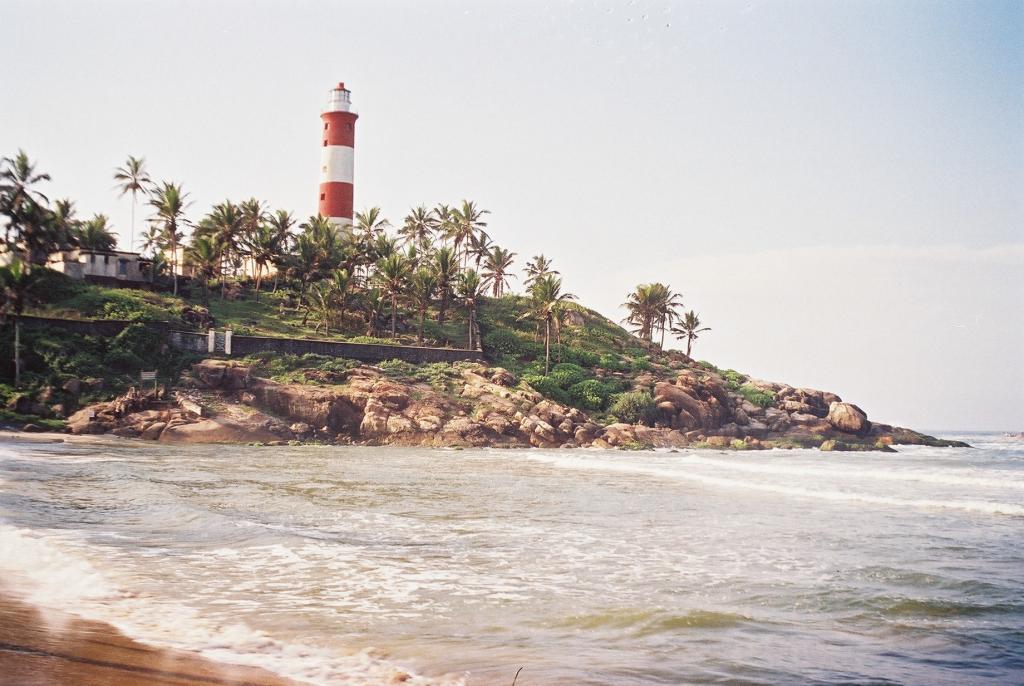
Kerala is famous for its backwaters, a large network of coastal rivers which are maintained for transport and draining of the soggy coastline. In Alleppey we are forced to sit through a rather boring talk on local spices before we are finally bundled into small canoes to cut a path through a floating garden of water hyacinth.
The exotic bird life is amazing here. Statue still herons wait to pounce, kingfishers dive with their flashes of blue and we spot a wood pecker swoop to take a fish. Other less adventurous more opportunistic birds hang about the Chinese fishing nets for a smelly morsel. None of this would have been seen if I’d been in charge of the pole cutting our canoe through the black water. At the back our river guide barely makes a ripple in the surface as we glide on by. When a fluorescent sea snake slithers across the canal it’s all droopy hands dangling in the water suddenly inside the boat. Eyes dart for its whereabouts.
Our tour finishes with a meeting of a toddy tapper. A nimble, barefooted young local scampers up the trunk of a coconut tree in the time it takes me to blink. Somewhere up there he is collecting the fermenting juice from the palm. He returns to ground level to offer us a taste of the toddy. We wince and lie telling him how delicious it is but I’m sure they saw through us. Our guide simply chucks back the rest of the glass saving us more embarrassment.
Our plan is to catch a local bus 250 kms to Trivandrum. The thought is enough for Robyn to get diarrhoea but somehow we still manage to board an already full bus. The view of the lush countryside is uninterrupted because there are is no glass in the bus windows. Warm air rushes over us. The driver is on a mission and when we stop for a break after two hours he sits at the wheel revving the motor ensuring we don’t wander too far. I’m surprised not to see the company motto ‘we overtake everything and stop for nothing’ carved into the dusty dashboard.
We finally spill from the bus thankful to have survived and start looking for a taxi for the last stretch to our hotel by the beach on Lighthouse road. The sound of the surf is calling us after our hot dusty time on the bus. Few words are spoken and the three of us simply gravitate down onto the black sand. I plunge into the water feeling immediately refreshed and then a wave does its best to knock me over. Few of the locals have gone beyond getting their knees wet.
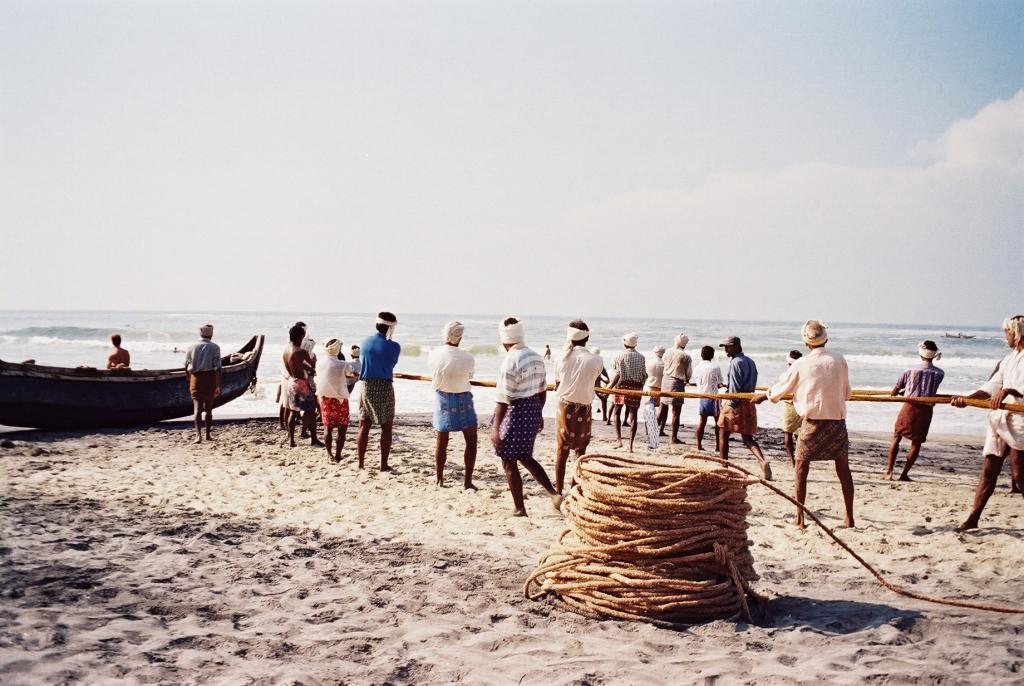
The next few days are spent enjoying the surf, eating fresh tropical fruit and tasty snacks at old school desks at our favourite beach cafe. There is German bread and real coffee to sip whilst we read the local newspapers. We are barely surprised by reports of buses crashes or buses plunging into rivers. The other major news is of 100 locals being permanently blinded and 20 others dying from drinking a locally made home brew. The brewers are on the run, evidently it’s a regular occurrence from illegal local stills.
Robyn and Jane take a long taxi ride all the way down to Cape Comorin some 100 kms further down the coast. It’s the Southern most tip of India a meeting place of the Bay of Bengal, the Indian Ocean and the Arabian Ocean. It’s a pilgrim town and evidently a perfect spot to enjoy amazing sunrises and sunsets. Along the way the driver will find some must-see temples and a dusty Maharaja’s palace of another time surrounded by touts with their hands held out wanting a few rupee.
I choose to stay at Kovalum and eat my way through the last remaining untested items at the German bakery on the beach. When I get bored I plunge into the ocean for a final swim but a massive drift of jellyfish has entered the bay leaving me frantically pushing back towards shore. At waist deep I’m suddenly engulfed in a thick soupy resistance. The sensation is repulsive, like wading through wet plastic bags. I stand back on the beach looking for welts, at least they didn’t sting me.
Our trip is drawing to an end. Chennai is our last destination before we head home. A short flight takes us to this busy bustling city. After the almost idyllic seaside villages of Kerala the pace of Chennai is frantic and unappealing. It isn’t helped by our taxi driver who has an unfortunate twitch which seems to limit his ability to to stay in the same lane for more than 2.5 seconds. I’m unsure if we will die from a swerving truck or murky diesel fumes which leave my throat raw just getting to our hotel.
It’s a public holiday tomorrow and already the festive feel has permeated through the locals. Fire crackers go off regularly and we brace ourselves for a noisy night. At dinner a family on a nearby table ask about our time in India and then add that if we have any problems whatsoever that they will fix them ? A tall order but stated with some conviction and a little knowing head wobble. Sure enough the night is as noisy as a war zone and I wake feeling jaded. And then a knock on the door ? “We have come to fix your plumbing” announces the toilet wallah. It appears that someone has crossed the hot and cold water and even the toilets are flushing hot water. I’m amused, no I’m crying with laughter and it’s lost on my plumbing friend.
Jane strikes a deal for a taxi for four hours hire. He is India’s slowest taxi but that is perfect for Robyn and Jane and he is then hired for all ongoing excursions. We visit the old fort museum filled with a great number of letters from the 1750s. Many South Indian companies offering business propositions to the English. It wasn’t long before the British saw trading opportunities here and wealth. Conquering India they then held sway for nearly two hundred years. England’s legacy of course is that all business transactions in India are done in triplicate and the bureaucratic red tape is the original English system on steroids. But it gives everyone a job.
Our snail paced taxi driver weaves through the polluted city crossing nose twitching stagnant rivers and finally drops us at a snake and reptile park. The poor animals are kept in barren concrete enclosures and it all seems a little inhumane. Jane hails a water wallah to splash a little water on a couple of water deprived turtles. Meanwhile Robyn has found a young boy with a keen eye to help her count the chameleons in another exhibit. Her teacher training rises to the surface and the boy looks up at her warmly each time he spots another.
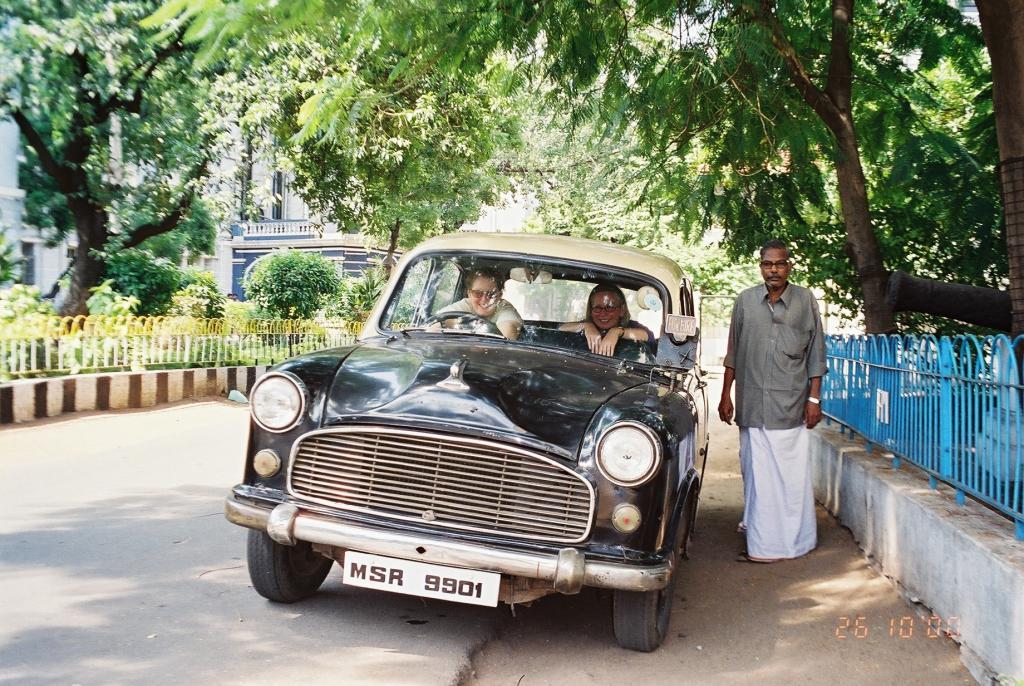
Our taxi takes us at funeral pace to the airport but we have arrived safely at our final destination. India has been a real assault on the senses. I love it and hate it in the same breathe. My eyes light up in wonderment then I find myself clenching my fists in frustration. Some of the simplest of tasks can be so difficult. Hidden behind the rules and bureaucracy are nearly a billion cousins, brothers and friends ready to take a few rupee from your pocket. I shall return but it’ll be a while and it will be some time before I can head to Roti Boti my local Indian restaurant. My spice intake is in the red.
